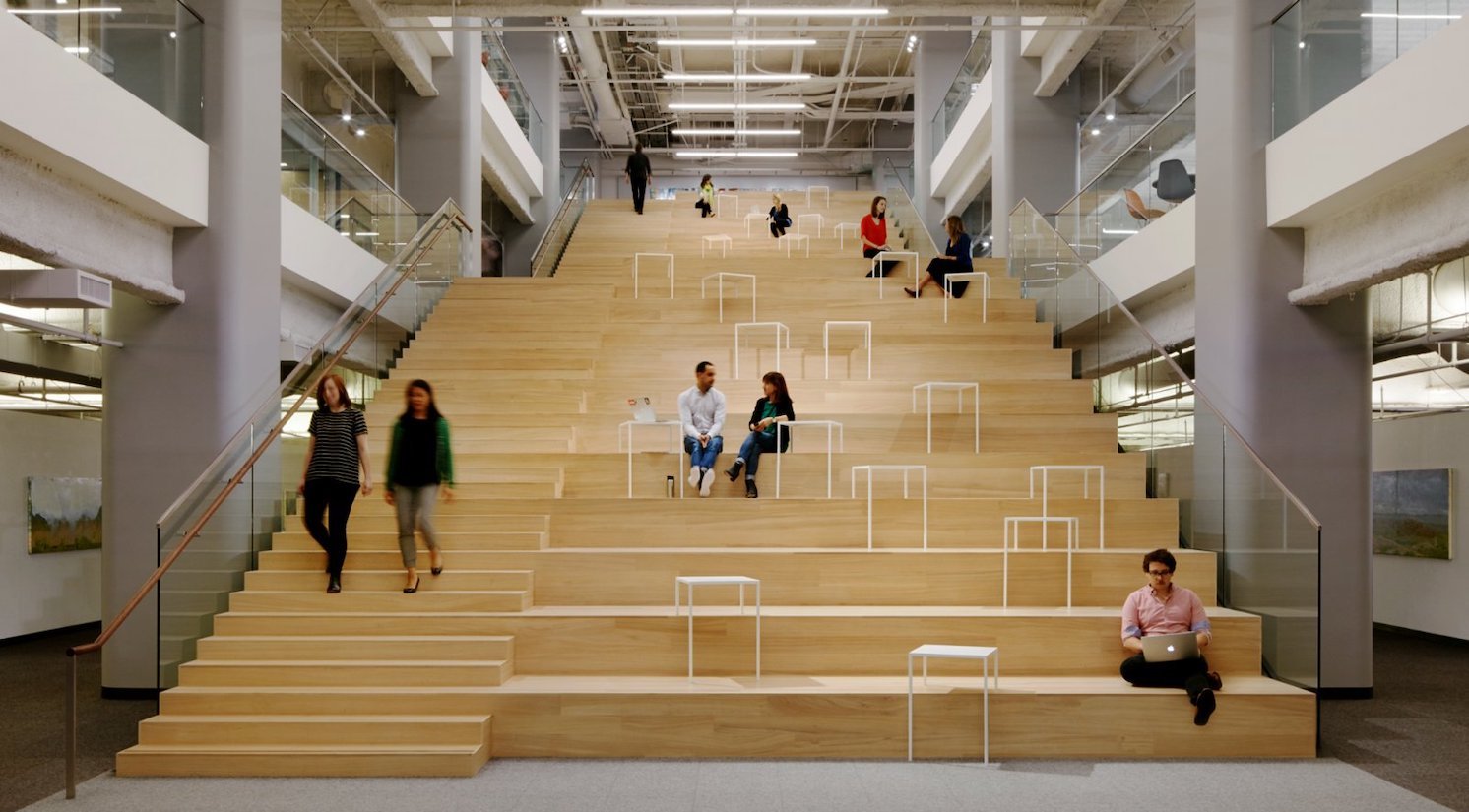The Delta Variant’s Impact on Corporate Real Estate

Image by: Bohlin Cywinski Jackson
In March of 2020, there was no telling to what degree and for how long we would be affected by the pandemic. A year and a half later, although there have been a great many strides in adapting to living in a world shaped by COVID-19, there is still tremendous uncertainty around what the future holds. When a new viral strain is added to the mix — the Delta variant — this uncertainty has the potential to grow to new heights. It seems no industry has been able to go on untouched by the pandemic, including corporate and commercial real estate.
Things have changed quickly, and real estate does not look, feel, or sound the same as it did in a pre-COVID-19 world. After more than a year navigating all that comes with a work-from-home lifestyle, whether employees thrived in a remote world or were simply getting through each day of telecommuting, corporate real estate tenants and property managers alike are understandably uncertain about the return to the office. They need to feel safe in order to return, but companies want more than the reassurance of safety to return to the in-person office experience. They want to be enticed.
During COVID-19, the needs and wants of the modern corporate tenant changed. Their employees are no longer content with being approached as just another member of an aggregated workforce. They want to be seen as individuals and humans with distinct needs and desires. And with the demand for talented employees growing, corporate real estate companies are competing to create these types of environments to win the interest of corporate tenants. Additionally, companies that are intent on returning to the office in any form are now facing the task of creating an office that is flexible and intuitive enough to provide every employee with the workspace they need to succeed.
So, how does corporate real estate evolve from here? How do companies move forward with their office spaces and bring their employees back in the face of a constantly evolving pandemic? This transition will require companies to keep their friends (employees) close and their enemies (COVID-19 and the Delta variant) closer.
How COVID-19 Has Changed Corporate Real Estate Forever
The monumental shift in the corporate real estate sector in the past two years is completely unprecedented. So many of the old rules of business have been broken and the bond between a typical corporate “office environment” and the employees that occupy it has lost much of its original hold. Instead, there is a growing trend towards building a community of tenants and collectively working to create work environments that are collaborative between employees, companies, and building-mates, and in turn, creating a place people want to spend their time.
Building managers and corporate companies are newly focused on workplace wellbeing in a post-pandemic world. Going beyond the twin pillars of location and operational facility, they now need to be able to communicate the latest safety information and other COVID-19-driven updates, and focus on workplace wellbeing, offering amenities like yoga classes and on-site childcare.
The primary changes to the real estate industry brought on by COVID-19 include:
1. How we work.
The most natural shift launched by the pandemic was due in large part to how communication practices have changed, shifting from a largely in-person corporate communication culture to a virtual or hybrid work environment for many teams. With everyone working from home at the same time, not only has the line between employee and employer been blurred, but the line between work and life was blurred as well. Entire workforces were tasked with quickly adopting new communication standards, relying on video communication and flexible work locations, often leading to a need for updated space options and workplace design changes to adapt to the new virtual or hybrid work culture.
A great example is work from home policies that were initially considered a non-starter for companies that did not trust their employees to fulfill their work obligations from home. Not only did the COVID-19 pandemic prove to everyone that this was not just a false assumption, but employees actually worked more when remote. In response, companies have created even more liberal remote and flexible work policies in order to meet their employees' new needs, which has changed the capacity of the corporate office and the space needs for employees.
What this means for corporate real estate: Companies will need to update their corporate spaces to adapt to a newly-hybrid workforce. General floor space may shrink due to a portion of remote attendees, while call boxes and conference rooms may increase due to the volume of video calls. And the need for collaborative spaces is rising. Companies will invest in workplace analytics and ways to quickly identify how many folks are working in a given space, creating a need for a more flexible corporate real estate portfolio.
2. “Why” we work where we work.
Employees around the world are taking this time to reflect on their workplace needs and reconsider whether their workplace is still a good personal and cultural fit. If they find that their corporate environment is not reflective of their culture and workplace wellbeing expectations of what a modern workforce should be, they no longer view their workplace as a positive environment and have a greater chance of leaving to find a workplace that does.
What this means for corporate real estate: Companies will need to create a relationship with their employees and gather information on what they want and expect out of the physical workplace. How can organizations invest in building events or other offerings that make employees want to join their company and stay there? Making investments in a building and company culture and comfortable work environment that are valuable will make brands stand out against the competition.
3. When we work.
In many ways, COVID-19 and the subsequent shelter-in-place mandates have altered when we work. As soon as remote work became the primary way of working for many industries in early 2020, employees began pivoting around their homelife and working outside the typical 9 to 5. Particularly for those employees for whom working from home includes caring for their children or other family members.
This new normal has sparked an increased appreciation for flexible work hours. Regardless of what an employee’s life looks like away from their dedicated workspace, research has shown that an increase in flexible hours means a decrease in burnout and an increase in job satisfaction.
What this means for corporate real estate: For corporate real estate companies, this means that a 9 to 5 schedule no longer works for all employees. When returning to the office, companies need to allow for hybrid work schedules and greater on-site amenities that accommodate the growing demand for flexible work hours.
This might mean shrinking office spaces to account for only partial workforces to be in the office together at one time, or introducing innovative solutions like desk hoteling. With more hybrid and flexible employees, corporate real estate portfolios may change, shifting to a satellite office model. The real estate sector can get ahead of this transformation by investing in workplace analytics, conducting frequent company-wide pulse check surveys, and investing in an employee experience team dedicated to learning what employees expect out of the physical workplace.
4. Where we work.
Companies are adapting to the changing landscape of major hubs of innovation moving or adapting from traditional business regions. During the pandemic, many professionals moved to “Zoom Towns,” smaller hubs outside of major cities that offered more affordable housing, less of a commute, and attractive dining and entertainment options. With hybrid work options, employees have the ability to choose where, when, and how they work best. So, how can companies adjust their corporate real estate portfolio to bring their employees into office spaces?
What this means for corporate real estate: After more than a year of remote work worldwide, it is now up to corporate real estate companies to win back their tenants and adapt the traditional work environment to suit their evolved needs. Essentially, they are tasked with making the office location more attractive to tenants than their personal home office environments. Doing so will require companies to develop a current understanding of what their tenants need from their workplace, as well as a knowledge of industry trends.
To entice tenants to return, they may need to offer:
- Satellite office locations
- More on-site amenities like coffee, lunch, and other on-site food options
- Retail services
- On-site activities such as a gym, yoga facilities, or meditation spaces
- Clean, orderly, and hautely-designed environments
- Opportunities for tenants to safely gather and interact with one another
- Community-based events
How Real Estate Companies Are Preparing for the Future
With COVID-19 and the Delta variant changing the corporate real estate landscape, companies and corporate real estate managers may be left wondering what actionable steps can be done to ensure a safe and enjoyable return to the office. Luckily, many organizations have already gracefully navigated this transition.
Salesforce Tower
Source: SFGate
The Salesforce Real Estate division is bringing life back to their headquarters with help from a new restaurant, Boutique Crenn, by famed chef Dominique Crenn. The restaurant aims to bring further notoriety to the building to make it a must-visit destination for local foodies. Salesforce is also promoting the support of local charitable organizations thanks to a whole floor dedicated to charitable organization use. This initiative is using placemaking to draw in their audience and bring people back to the space. They know their audience and created a partnership with a brand that is authentic to the surrounding community and has cachet - a perfect formula.
Pier 70
Source: Pier 70 Drive-In (DPEM)
Currently restoring and adding new facilities to create mixed-use development for artists and the public, Pier 70 is working to create experiences that integrate COVID safety as a design feature, in order to ensure people still get to connect and we do not just shut down gathering altogether.
At a time when the community really needed connection, we helped Pier 70 create a multi-weekend, socially-distant drive-in movie experience that safely brought the community to Pier 70 and reflected the property’s values: Made of Creativity, Made of the Bay, Made for Everyone. The drive-in required thorough, city-agency approved COVID protocols, which were thoughtfully designed into the experience. As they continue to prioritize safety in their experiences, Pier 70 continues to host outdoor programming. Ultimately, they are using their construction project site to offer the community a safe space to connect through applying Place Purpose to each activation to create social destinations.
The real estate landscape is changing for companies whether they rent, lease, or own their corporate spaces. With a change in the way that people work, a change in the needs of employees, and a more flexible outlook on in-office work overall, companies need to be prepared to adapt to unexpected environmental events, like COVID-19 and the Delta variant. Brands will need to ensure they have the tech, strategy, and workplace attitude to support employees through uncertain times, and create spaces and a community that builds people up and creates a supportive, lasting company culture.
To get started, set up a consultation with our team to explore how you can inject purpose into your spaces with placemaking.

![→ Explore the DPEM Guide to Placemaking and learn more about how businesses are transforming spaces and creating meaningful experiences for their target audiences in their real estate portfolios. [Free Guide]](https://no-cache.hubspot.com/cta/default/8651066/e2f0b211-ef5e-4d2d-9816-dc4c84078fbf.png)
